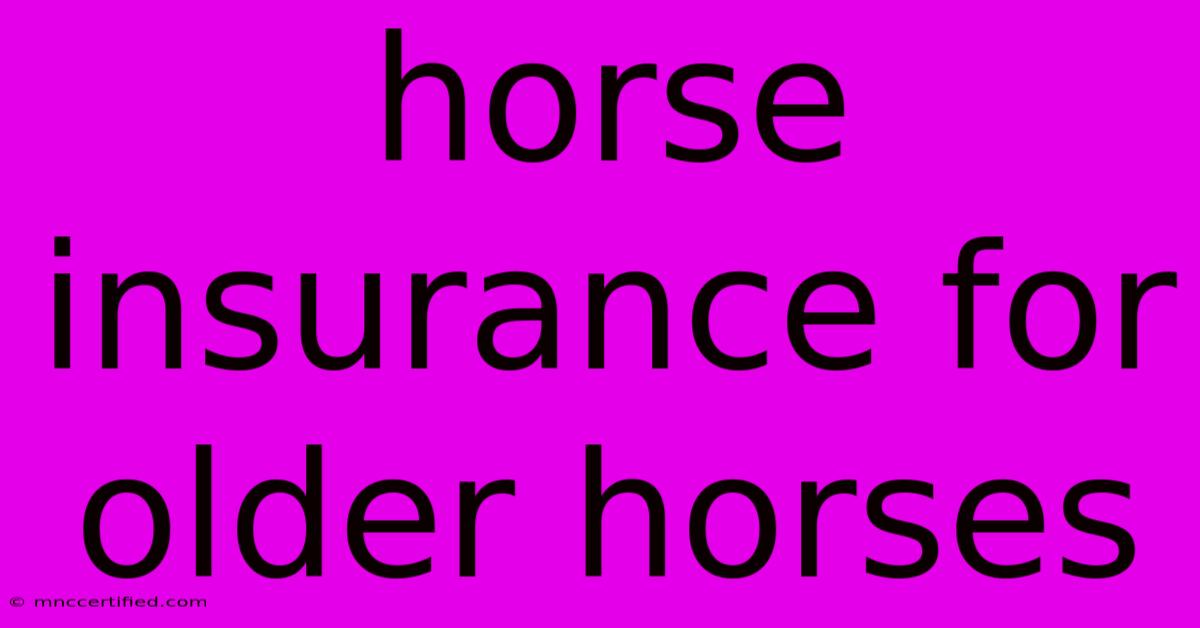Horse Insurance For Older Horses

Table of Contents
Horse Insurance for Older Horses: A Comprehensive Guide
Finding the right insurance for your aging equine companion can feel daunting. Older horses, while often cherished members of the family, present unique challenges for insurers. This comprehensive guide will navigate you through the complexities of securing suitable horse insurance for senior horses, helping you understand the factors involved and make informed decisions.
Understanding the Challenges of Insuring Older Horses
Insuring an older horse differs significantly from insuring a younger one. Several factors contribute to this:
-
Increased Risk of Pre-existing Conditions: As horses age, they become more susceptible to a range of health issues, from arthritis and Cushing's disease to colic and various forms of lameness. These pre-existing conditions often impact the insurability and the cost of coverage.
-
Higher Claim Likelihood: The probability of requiring veterinary care increases significantly with age. This translates to a higher likelihood of claims, making older horses more expensive to insure.
-
Limited Coverage Options: Not all insurers offer policies specifically designed for senior horses, and those that do may have stricter eligibility criteria and higher premiums. You might encounter limitations on coverage amounts or types of illnesses covered.
-
Reduced Value: The market value of a horse typically decreases with age, impacting the potential payout in case of death or permanent injury.
Key Factors to Consider When Choosing Insurance
Finding the right insurance requires careful consideration of various factors:
1. Age Limits and Eligibility Criteria
Different insurers have varying age limits for their policies. Some might stop covering horses beyond a certain age (e.g., 15 or 20 years), while others might offer coverage but with significant restrictions or higher premiums. Carefully review the policy documents to understand the insurer's age restrictions and any associated limitations.
2. Pre-existing Conditions
Disclosing pre-existing conditions is crucial. Failing to do so can lead to claims being rejected. While some insurers may offer limited coverage for certain pre-existing conditions, others may exclude them entirely. Be transparent about your horse's health history.
3. Coverage Options and Limits
Assess your horse's specific needs. Do you require comprehensive coverage encompassing illness, injury, and death? Or will a more basic liability policy suffice? Consider the level of coverage you need versus the cost. Pay close attention to the policy limits – the maximum amount the insurer will pay for a specific claim.
4. Premium Costs
Premiums for older horses will generally be higher than for younger horses. Compare quotes from multiple insurers to find the best value for your needs. Remember that the cheapest option isn't always the best; consider the level of coverage offered.
5. Reputation and Claims Process
Research the insurer's reputation and read online reviews. A positive reputation and a straightforward claims process are crucial, especially when dealing with the potential stress of a veterinary emergency.
Types of Horse Insurance for Older Horses
While comprehensive coverage might be more expensive, it's often worth the investment for an older horse. However, consider these options:
-
Liability Insurance: Covers third-party claims if your horse causes injury or damage. This is usually a worthwhile investment regardless of age.
-
Mortality Insurance: Covers the loss of your horse due to death.
-
Veterinary Fee Insurance: Covers veterinary bills incurred due to illness or injury. This is particularly crucial for older horses prone to health problems.
-
Surgical Insurance: Covers the cost of surgery if required.
Tips for Finding Affordable Insurance
-
Shop around: Obtain quotes from multiple insurers to compare premiums and coverage.
-
Consider a lower coverage level: You might be able to save money by opting for a lower coverage limit.
-
Maintain good health records: Comprehensive health records can help demonstrate your horse's overall health and potentially influence premium costs.
Conclusion
Insuring an older horse requires careful planning and a thorough understanding of the available options. By carefully weighing the factors discussed, and by shopping around and comparing quotes from different insurers, you can find suitable and affordable insurance coverage to protect your valued equine companion in their senior years. Remember, proactive planning now will provide peace of mind later.

Thank you for visiting our website wich cover about Horse Insurance For Older Horses. We hope the information provided has been useful to you. Feel free to contact us if you have any questions or need further assistance. See you next time and dont miss to bookmark.
Featured Posts
-
Sebanda Insurance Franchise Cost
Nov 22, 2024
-
Insurance Companies Lancaster Ca
Nov 22, 2024
-
Russias Missile Attack On Ukraine Putin
Nov 22, 2024
-
Fb Taylor Insurance Nederland Tx
Nov 22, 2024
-
Florida Law Motorcycle Insurance
Nov 22, 2024